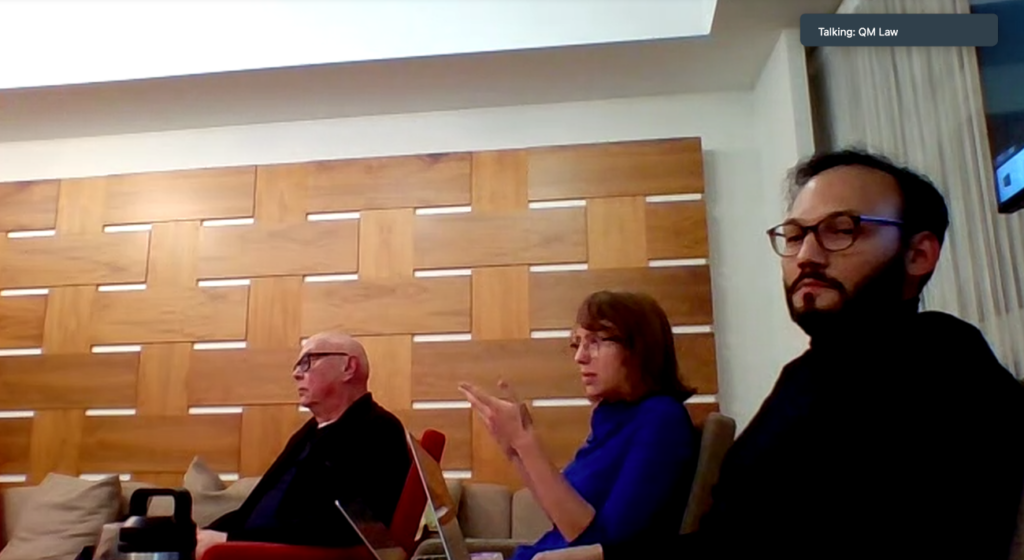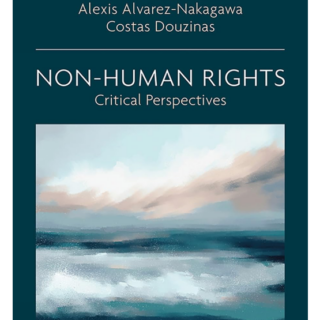At the end of October, Julian Gaskell attended a launch event for a new law and humanities book aiming to lay the foundations of Non-Human Rights. Entitled Non-Human Rights. Critical Perspectives, it is edited by Alexis Alvarez-Nakagawa and Costas Douzinas. Here’s what Julian made of it all!
Human Rights have become the catch all term in the fight against the injustices of the state and so I was intrigued by this provocative book title of non-human rights. Since the introduction of the Human Rights Act in 1998, which gave legal effect to the European Convention on Human Rights more and more questions are now being posed not just about human rights but non-human rights, particularly about the environmental crisis and the impact of AI technology on society. So, underneath this playful title I knew there was a serious point being made, and wondered whether this book would provide the answers.
I better start with a confession that I’ve not actually read the book, but I did attend the launch (albeit online) and listened to three of the contributors talk about their chapters – so I can give a reasonably honest opinion.
The first thing to point out is that you will likely need a good glossary. Listening to the speakers felt like walking into a lecture you’ve not prepared for or even worse you suddenly realise you’re sat in the wrong classroom. Maybe I shouldn’t concede this but I was looking to take away a newly found enlightenment on non-human rights (and possibly human rights) but found myself largely overwhelmed with academic obfuscation centred around the humanities to begin with. This is your first clue as to whether this book might be of interest to you.

The speakers may provide further direction on the book’s usefulness. The chair of the event was Alexis Alvarez-Nakagawa, a Senior Lecturer in Law at Queen Mary University and a fellow at the Institute of Humanities and Social Sciences. He’s working on a project about the extension of rights to non-humans.
The next speaker was Costas Douzinosis, an emeritus professor of law and founder of the Birkbeck Institute for the humanities and law, and the author of such books as Human Rights and Empire, and the Radical Philosophy of Rights (his chapter on “Do Androids Dream of Human Rights” was one of the few literary references I can admit to knowing).
The final speaker was Dr Marie Petersmann, an assistant professorial research fellow at LSE, whose work focuses on international law, ecology and critical perspectives and her books include When Environmental Protection and Human Rights Collide. Their involvement hopefully establishes the book’s credibility, which if you needed further proof of, it’s priced at an eye watering £84.61 (with student discount).
The book consists of 12 chapters from 12 different authors all roughly 20 pages each with a different take on non-human rights but all broadly speaking falling under one of the headings of either defining human and non-human, animals, the environment or technology.
As Alexis Alvarez-Nakagawa points out in the introduction, and which formed part of my initial intrigue on non-human rights, the term in a way is becoming part of our ordinary legal landscape and vocabulary, in which he says animals, rivers, ecosystems and AI robots are in the process of being considered subjects of rights and are a trend in domestic, regional and international jurisdiction settings. This roughly speaking brings us up to speed on the relevance of the topic and the chapters that follow fill in the blanks of what that actual means or could mean.
Despite getting slightly lost at the beginning, I was nonetheless intrigued by how difficult it seemed to define non-human. The difference between non human rights and non-human rights, with or without the hyphen making all the difference seemed a trivial technicality that also bemused the autocorrect spelling.
The proposal of a dual trajectory of human rights and non-human rights is one he acknowledges as being met with both enthusiasm and derision but if, as he says, academic discourse feels like human rights have failed on its ‘messianic’ promises of a fairer, equal and just world, surely it’s going to be even harder for non-human rights?

In the cases of animals, these include the fight for ‘Chucho’ the spectacled bear from the USA, ‘Sandra’ the orangutang and ‘Cecilia’ a chimpanzee from Argentina who have unsuccessfully and successfully managed to acknowledge their ‘non-human person’ rights.
The beauty of these intellectual forays is there seems no limits to how far they can go. The introduction of theories such as Gaia named after the Greek goddess of the earth seemed quite logical, after all who else is the earth to call upon for its rights but the gods? Of course there is an actual Gaia scientific hypothesis from James Lovelock to be adduced as well.
It has an international perspective with the authors focusing on the EU, and North and South America, as one might expect from a book on (non) Human Rights and the environment. So there is a void there from a UK jurisdiction point of view if that is what you are looking for. The recent announcement of the COP29 deal where rich nations are to pay $300 billion a year until 2035 to poorer nations to deal with climate change, it would be interesting to know how these and other scenarios will be playing out in the UK as a ‘fossil economy’ contributor.
The book takes a look at the impact of technology and machines too and a future we can sense coming but which isn’t quite here yet. The transhumanist ‘singularity’, which is suggested we are already past the point of and need to consider the rights about, however fanciful or frivolous it seems, can already be seen happening in litigation with self-driving cars.
Overall, it is an academic book with a strong humanities and social sciences bias aiming to blaze a trail in the development of non-human rights. If that sounds like the missing piece to your research then it could be the Christmas book for you. Personally, after wading through the cosmovisions and Anthropocene terminology I left the online event craving the case law and legislation that hasn’t been written yet.
The event was held on Wednesday 30th October 2024 at Queen Mary University.
Panellists:

- Alexis Alvarez-Nakagawa, QMUL (chair)
- Costas Douzinas, Birkbeck College, University of London
- Dr Marie Petersmann, LSE
Many thanks to Julian for pulling together his thoughts on quite a challenging area of discussion.
Having completed the GDL, Julian is studying the BVS at City. He says: I’m interested in making the connection between law and media / journalism.

